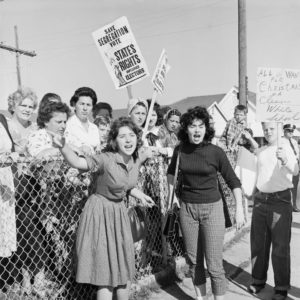NO! In the scientific and taxonomic sense, there is no such category as race. In spite of this, RACISM IS REAL!
The concept of race came into being sometime between the 17th to 18th centuries. Although the history of slavery is centuries old and deserves a separate post, it was the focus of the slave trade on central and southern Africans starting in 1442 by the Portuguese that eventually led to the creation of the human construct of race.
Because of the different color of their skin, it was easier to identify these as slaves, even though there had been (and continued to be) European, Arab, Indigenous, and Oriental slaves. By the 18th century, the West was defined as civilized by its own educated elite; white, of course. (The Eastern world had already been civilized centuries before, but that, too, is another story.) In the West, the 1700s became known as The Age of Enlightenment, but it didn’t quite fulfill that title. This was when racial politics became blurred with racial “science,” which is not science at all, but remains with us to this day.
Racial politics developed because of the expansion of slavery, but there needed to be a rationale for it. After all, the West was civilized and analytical. There were major discoveries in astronomy, biology, chemistry, mathematics, and physics, for example, that led the way to more and more learning about our universe and our planet. What better way to rationalize the inhumanity of African slavery than through science, and, thus, the concept of “racial science” developed and the construct of an inferior race was created for justification of slavery. Of course, there is no such thing.
“In the biological and social sciences, the consensus is clear: race is a social construct, not a biological attribute…. The popular classifications of race are based chiefly on skin color, with other relevant features including height, eyes, and hair. Though these physical differences may appear, on a superficial level, to be very dramatic, they are determined by only a minute portion of the genome: we as a species have been estimated to share 99.9% of our DNA with each other. The few differences that do exist reflect differences in environments and external factors, not core biology.” [“How Science and Genetics Are Reshaping the Race Debate 21st Century,” Harvard University, Science in the News Blog, 4/17/2017]
The false concept of an inferior race was easy to use for economic, political, social, and moral justifications, thus, it became widespread. Racism is a cultural, political, and socially human-created construct resulting from the original false notion of race as a way of categorizing Homo sapiens, which enabled the creation of a hierarchy of races.
Race is false; racism is not. Part of its ignorant persistence in the United States is because it has always existed here since the first occupation by Spaniards in Florida in 1565, who brought black slaves with them. More commonly known is that the English brought black slaves to Jamestown (Virginia) in 1619.
The concept of white supremacy is so incredibly and analytically unsound, it would be laughable, except that it creates incredible economic and social damage and is still embraced. But it is equally incredibly and analytically unsound to think racism exists only in white supremacy.
In “How to Be an Antiracist,” Ibram X. Kendi argues persuasively that no one can be not racist, but can be against racism. Because racism, as well as sexism and other prejudices and biases, are so culturally, societally, and individually ingrained we must constantly be on alert to make a stand against them: all of them; but racism in particular because it is systemic. Sexism has been also, but progress is being made on that faster than racism against people of color, which became more publicly acceptable through the lead of the former administration, not totally unlike the Jim Crow years. Although, frankly, sexism was also given public acceptance via that same former president, but, again, that is another post.
What can you do about racism? Kendi recommends political action. As a very political person, I, too, would recommend that. For years I believed it was a matter of education and appealing to our (white) morality. Obviously, that does no good, which is not to say one shouldn’t become educated abut racism. It was through my reading of James Baldwin, Ibram Kendi, and others that I finally understood that trying to “do good,” spreading the word about racism, trying to educate others about the damage systemic racism does to our country was not helpful. Kendi calls it suasion. He argues that policy has to be changed first, mental change comes later. The core issue of racism is power, not immorality nor ignorance.
Nevertheless, to work to change policy requires knowledge of who, what, and how. Reading books such as Kendi’s, also Caste: The Origins of Our Discontents by Isabel Wilkerson is another good one. There are numerous reading lists online about racism. The best education, many agree, is to talk about racism with a Black friend who is willing to be candid about it. Most importantly, DO NOT REMAIN SILENT when you observe racism (or any other ‘ism) happening, and learn what you can do to influence and change systemic racist policy.
LINKS [Links to topics on slavery, racism, the civil rights movement abound on the Internet, but here are just two. Click on the blue highlighted topic]
Slavery: I have had a lot of trouble finding an accurate history of the slave trade and slavery. Most, even from reliable sources such as the Smithsonian, PBS, and the New York Times, are mostly true but not completely. Several sources are necessary to get an accurate history. I recommend Caste: The Origins of Our Discontents by Isabel Wilkerson, mentioned above, but even that starts with 1619, and it definitely started before that, although not as well documented.
Civil Rights Movement: I also recommend some books: James Baldwin’s Notes of a Native Son, Nobody Knows My Name, and The Fire Next Time; March with Me, a novel by my sister, Rosalie T. Turner, based on historical facts and participants, in the Children’s March, Birmingham, AL 1963, Cypress Creek Publishing, 2013. These books like the ones mentioned above are available by order from independent bookstores, and, of course, Amazon.com.
“Prejudice, not being founded on reason, cannot be removed by argument.”
Samuel Johnson, one of the best-known figures of 18th century letters and literature; as well as arguably the best-known lexicographer of the English language.
“Racism is man’s gravest threat to man – the maximum of hatred for a minimum of reason.”
Abraham Heschel, an American rabbi and leading Jewish theologian and philosopher in the 20th Century.
I welcome comments on all my posts, but would be particularly interested in hearing suggestions you may have on reversing systemic racism.





